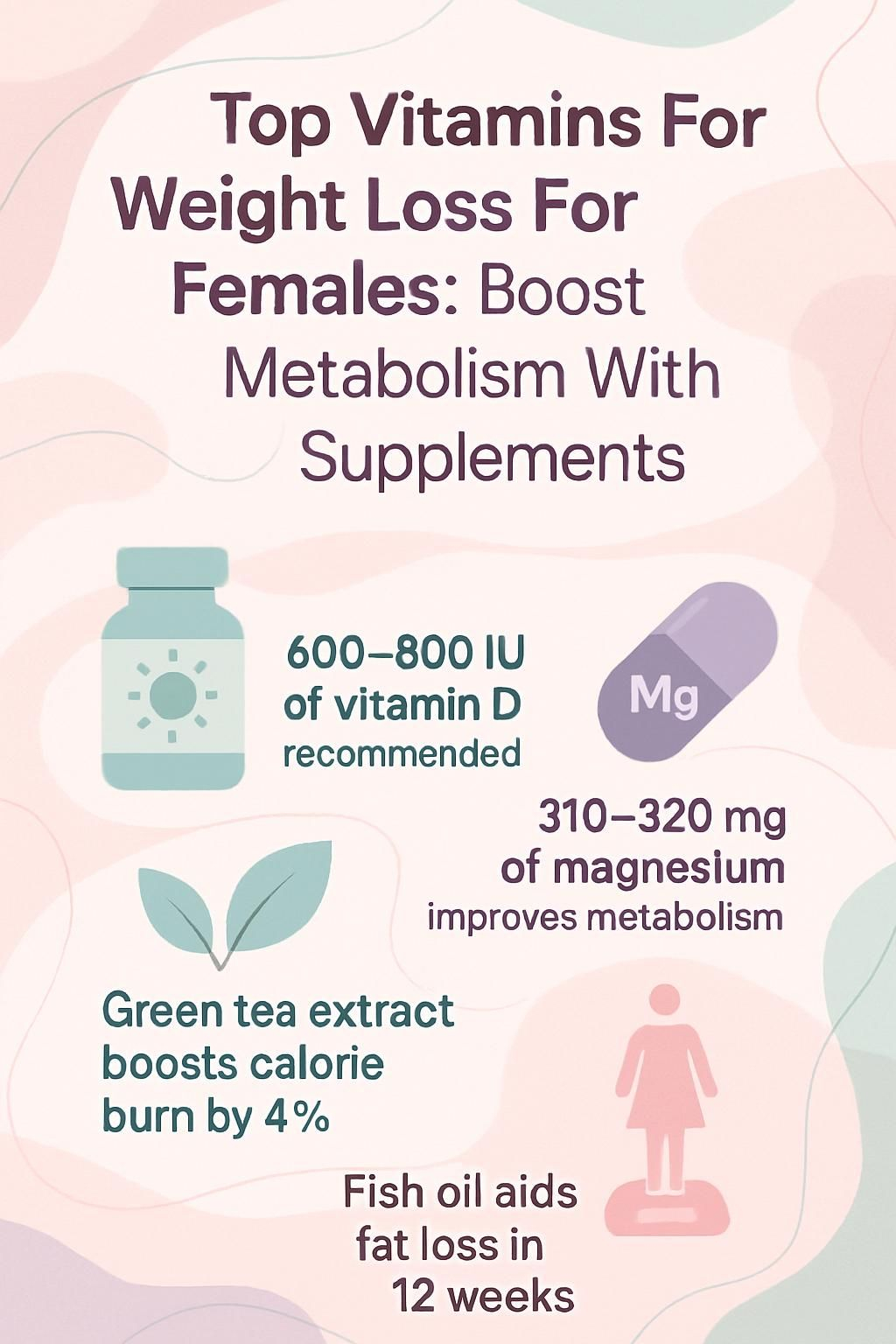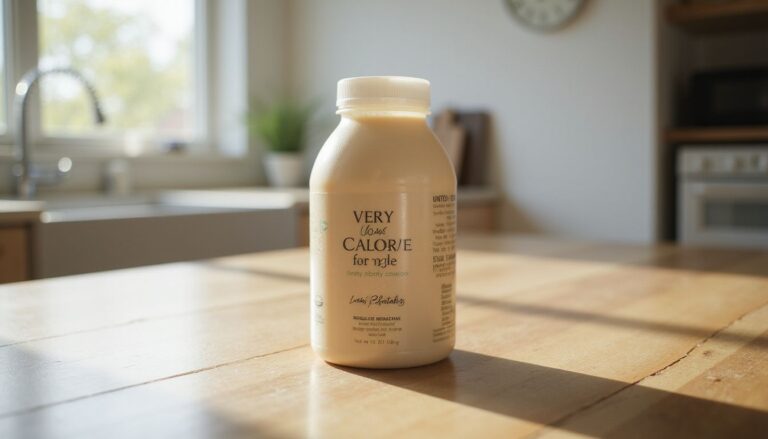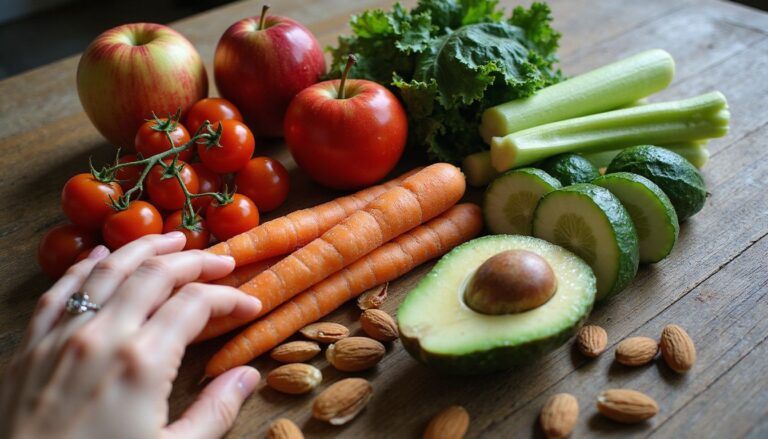Top Vitamins For Weight Loss For Females: Boost Metabolism With Supplements
Our Nutrition Assistant AI Suite will transform your body. You will lose fat, get toned, and build muscle. Gain confidence and optimal health.
You want steady weight loss yet it is hard to know which vitamins and supplements actually help. Many women notice a slower metabolism with age, and low nutrient levels can make progress even slower. The right vitamins and supplements for weight loss can support your plan, especially when you pair them with smart eating and regular exercise.
This guide explains how key nutrients, including B vitamins, vitamin D, vitamin C, magnesium, zinc, omega-3s, and green tea extract, may support energy, appetite control, and fat burning. You will see what the research suggests, how to meet daily needs, and where supplements can fit safely.
Use these insights to build a focused plan that protects your health and supports your goals.
Key Takeaways
- Evidence suggests B vitamins, vitamin D, magnesium, zinc, vitamin C, omega-3s, and green tea extract may support weight loss when combined with diet and exercise.
- Meeting daily needs such as 600 to 800 IU of vitamin D and 310 to 320 mg of magnesium may improve appetite control, energy, and metabolism.
- Deficiencies in nutrients like vitamin B12 or magnesium are linked to slower fat burning, more cravings, and low energy in females.
- Green tea extract can temporarily raise calorie burn by about 4 percent due to catechins. Harvard T.H. Chan School notes fish oil may support modest fat loss over twelve weeks in adults (2024).
- Talk with a healthcare provider before starting any supplement, since benefits are usually modest and high doses can cause side effects.

How Vitamins Support Weight Loss

Vitamins and minerals help your body turn food into energy and burn calories through the day. Specific gaps can stall metabolism, raise hunger, and make it harder to keep a healthy body fat range.
What role does metabolism play in managing weight?
Metabolism is the process that turns food into energy. A faster metabolic rate helps you burn more calories, even while resting. Many weight loss supplement blends use caffeine to increase fat breakdown, especially during cardio exercise.
National Institutes of Health summaries report that regular caffeine intake may support small reductions in body fat over time. Green tea extract contains EGCG, a plant compound that supports thermogenesis, which is heat production that raises calorie burn, and may reduce fat absorption from food.
A healthy metabolism lets you convert food into energy efficiently and manage body fat stores.
How do vitamin deficiencies affect weight loss?
Low levels of key vitamins can slow weight loss and reduce energy. Vitamin B12 deficiency has been tied to obesity and poor blood fats in animal research. B12 supports cellular energy, so low levels may slow fat burning. Vegans and vegetarians have higher risk because B12 is found mainly in animal foods.
Magnesium deficiency is common in people with extra weight or diabetes. Low magnesium may increase inflammation and disrupt blood sugar control, both of which can interfere with weight management.
A daily multivitamin or targeted supplement can help during calorie restriction when food variety drops. Avoid high doses without medical advice. Excess intake may cause problems such as appetite loss, nausea, vomiting, weakness, or irregular heartbeat. Always consult a healthcare provider before starting supplements.
B Vitamins: Energy Boosters for Weight Loss
B vitamins support metabolism and energy, which can help you stay active and consistent. Many women notice steadier energy when intake improves through food or a supplement.
How do B12, B6, and B5 improve metabolism?
Vitamins B12, B6, and B5 help your body use carbohydrates, proteins, and fats for fuel. Vitamin B12 supports the breakdown of fats and proteins so nutrients get used for energy instead of stored as fat. Low B12 often shows up as tiredness during weight loss efforts.
Vitamin B6 participates in more than 100 enzyme reactions that process amino acids and carbohydrates. It also helps regulate blood sugar by supporting the conversion of glycogen, your stored glucose, back into usable energy. Nutrition experts note that low B6 can slow metabolic functions and make losing belly fat harder.
Vitamin B5 helps form coenzyme A, a helper molecule needed to break down fatty acids. Together, these vitamins act like energy helpers that support digestion, muscle function, and steady effort toward your goals.
What are natural sources of B vitamins?
Food can meet most of your B vitamin needs and also adds fiber and protein for fullness. Try a mix of the following options on a regular basis.
- Whole grains like brown rice and oats provide B1, B3, and B5 to support energy production and fat use.
- Leafy greens such as spinach and kale deliver B9, which is helpful for plant-based eaters and supports digestive health.
- Beans and lentils supply B6 and B7 and fit many gluten-free diets while supporting fat burning.
- Eggs offer B12 and are helpful if you do not eat meat or fish.
- Dairy products such as milk and yogurt are strong sources of B2 and fit many balanced plans.
- Fish like salmon contains B12, which supports metabolism and energy.
- Poultry and lean beef provide a broad range of B vitamins that support red blood cells and prevent anemia.
- Nuts, including almonds, contribute B5 and healthy fats that can reduce cravings.
Relying on these foods helps reduce the need for diet pills for women, which vary widely in quality and evidence per the National Center for Complementary and Integrative Health.
How can B-complex supplements aid weight management?
B-complex supplements supply a set of B vitamins in one tablet or capsule. These nutrients support the breakdown of carbs, proteins, and fats for energy. During strict diets, low intake can lower your metabolism and increase fatigue.
Research links low B12 with a higher risk of obesity and impaired fat burning in adipose tissue. If your eating plan limits animal foods or calories, using a quality B-complex can help keep energy up. That makes it easier to train, move more during the day, and avoid brain fog.
Food sources still matter. Meat, eggs, fish, leafy greens, beans, and fruit provide important amounts, yet strict plans make it hard to meet needs. A combined approach, food first and supplements if needed, usually works best.
Vitamin D: Regulating Appetite and Hormones
Vitamin D affects hormone balance and appetite signals. Many weight loss products include it because it can support healthy metabolism in females.
How does vitamin D influence appetite control?
Your body uses vitamin D to help regulate hormones that control hunger and fullness. Low vitamin D can disrupt leptin, the hormone that tells your brain you have eaten enough. That can raise cravings and overeating.
Clinical studies find that people with higher blood vitamin D sometimes have better appetite control and, in some cases, greater weight loss. If a blood test shows low vitamin D, a supplement may help with hunger cues and insulin response. This works best with nutrition changes guided by your healthcare provider.
What are the best sources of vitamin D?
You can get vitamin D from sunlight, foods, and supplements. Here are practical options that fit many routines.
- Sun exposure for 10 to 30 minutes several times weekly helps your skin make vitamin D naturally.
- Fatty fish like salmon, mackerel, and sardines provide roughly 400 to 600 IU per three ounces.
- Fortified foods, including milk, orange juice, and cereals, often deliver 100 IU or more per serving.
- Egg yolks supply about 40 IU per egg and can support overall intake.
- Vitamin D tablets or capsules help you meet daily needs, especially with limited sun.
- Cod liver oil offers about 450 IU per teaspoon, which some people use for a bigger boost.
- UV-exposed mushrooms can provide up to 400 IU per cooked cup, useful in plant-based diets.
- Some meal replacement shakes are fortified with higher vitamin D levels based on FDA guidance.
Consistent intake can help you avoid fatigue and mood changes linked to low vitamin D. A steady plan supports metabolism during weight loss while also supporting healthy blood pressure and heart rate.
What are effective vitamin D supplementation tips?
Smart dosing and timing help vitamin D work better for you. These tips can guide your routine.
- Take vitamin D with a meal that includes healthy fats, such as olive oil or salmon, to improve absorption.
- Most adults aim for 600 to 800 IU daily, though some need more if levels are low. Confirm your dose with your healthcare provider.
- Choose vitamin D3, called cholecalciferol, since it raises blood levels more effectively than D2.
- Ask for a blood test to check your status if you feel fatigue, muscle weakness, or bone pain.
- Watch for side effects like constipation or abdominal pain with high doses over time. Discuss any concerns with a professional.
- Buy products with third-party testing and clear labels. Be cautious with blends that add extra stimulants.
- Combine supplements with safe sun exposure for 10 to 20 minutes on several days each week when possible.
- Review possible drug interactions, such as certain anticonvulsants or steroids, before you start.
- Track energy, mood, and weight trends after starting. Report any issues such as stomach upset or blood pressure changes.
I struggled with low energy during my own weight loss effort until my doctor checked my vitamin D. A simple supplement plan, plus morning walks, improved my mood and stamina within weeks.
Vitamin C: Supporting Fat Oxidation
Vitamin C supports fat oxidation, which is the process of breaking down fat for energy. Getting enough helps your body use fat more efficiently during exercise and daily activities.
How does vitamin C help with fat metabolism?
Vitamin C is needed to make carnitine, a compound that carries fatty acids into mitochondria, the energy centers inside cells. This step allows your body to break down fat for fuel. Low vitamin C may slow this process and reduce fat loss during activity.
People with adequate vitamin C can burn more fat during exercise compared with those who are low. Strong antioxidant intake also supports overall metabolic health.
Which foods are rich in vitamin C?
It is easy to meet your vitamin C needs with a varied diet. Try these options:
- Red bell peppers provide about 95 mg per half cup.
- Oranges and other citrus fruits give about 70 to 80 mg per fruit.
- Strawberries offer around 85 mg per cup.
- Broccoli supplies about 51 mg per half cup cooked.
- Kiwi contains around 64 mg per medium fruit.
- Brussels sprouts provide about 48 mg per half cup cooked.
- Pineapple gives close to 79 mg per cup.
Mix several sources across the week to keep levels steady and support recovery after workouts.
What is the recommended vitamin C dosage for weight loss?
Women generally need at least 75 mg of vitamin C daily. Some studies for fat oxidation use 500 to 1,000 mg per day from tablets or capsules. This range is usually safe for many adults.
Meeting daily needs can help your body use fat during exercise and may reduce fatigue. Talk with your healthcare provider before raising your dose to make sure it fits your health status.
Magnesium: Balancing Blood Sugar and Stress
Magnesium supports steady blood sugar and helps you handle stress, both important during weight loss. Many women feel calmer and sleep better once intake is adequate.
How does magnesium affect weight and inflammation?
Magnesium helps insulin work properly, which steadies blood sugar and may curb cravings. Women with higher magnesium intake often show better metabolic health, which can make weight management easier. Low magnesium is linked with higher inflammation and elevated blood pressure.
Your muscles and nerves rely on magnesium. Adequate intake supports workouts and recovery, so you burn more calories over time. Adults should target 310 to 320 mg per day from food. Supplements can help if your diet falls short.
What foods provide good sources of magnesium?
Eating a range of foods keeps your magnesium levels stable. Add these choices to meals and snacks.
- Leafy greens like spinach provide about 79 mg per 100 grams. Add to salads or smoothies.
- Nuts such as almonds and cashews offer roughly 76 to 82 mg per ounce. Keep a small handful on hand.
- Whole grains, including brown rice, quinoa, and oats, supply 44 to 64 mg per cooked cup.
- Beans like black beans and kidney beans give about 60 mg per half cup.
- Seeds, especially pumpkin seeds, deliver about 168 mg per ounce.
- Dark chocolate at 70 percent cacao provides around 64 mg per ounce. Enjoy small portions.
- Shellfish such as shrimp add magnesium and helpful omega-3 fats.
- Avocados provide healthy fats and about 58 mg per fruit.
- Chitosan is a shellfish-derived fiber used in some products. It is not a magnesium source and should not replace food.
Foods rich in magnesium support fat metabolism and energy. If your healthcare provider suggests it, you may pair food with other supplements such as chromium or conjugated linoleic acid.
Which magnesium supplements are best for weight loss?
Magnesium glycinate and magnesium citrate are popular choices. Glycinate is easier on the stomach. Citrate can help with regularity for some people.
Too much magnesium can cause diarrhea, nausea, or, in rare cases, heart problems. Most adults need 310 to 420 mg per day from all sources, according to the National Institutes of Health. A healthcare provider can help you select the right type and dose. Many people also notice better sleep and less bloating.
Several meta-analyses suggest that meeting mineral needs supports healthier metabolic outcomes compared with placebo.
Zinc: Reducing Cravings and Supporting Metabolism
Zinc helps regulate appetite signals and supports key enzymes in metabolism. If your intake is low, cravings and snacking can rise.
How does zinc help with weight management?
Zinc plays roles in processing proteins, fats, and carbohydrates. A 2013 study found that women taking zinc reported less hunger and fewer cravings for high-calorie foods than a placebo group. Zinc also helps regulate leptin, the fullness hormone.
Women need about 8 mg of zinc daily. Deficiency can slow progress. If food does not meet your needs, a supplement can help you reach the target safely.
What are zinc-rich foods to include in the diet?
Try a mix of animal and plant sources to cover your needs. These are reliable options:
- Oysters are among the richest sources, offering over 70 mg per 100 grams.
- Lean beef can provide about 12 mg per 100 grams cooked.
- Pumpkin seeds supply around 7 mg per 100 grams and work well on salads.
- Chickpeas deliver roughly 3 mg per cooked cup and fit vegetarian plans.
- Cashews provide about 5.6 mg per 100 grams and make easy snacks.
- Crab offers nearly 7.6 mg per 100 grams and adds omega-3s.
- Fortified cereals may contain up to 15 mg per serving. Check labels for details.
Focusing on foods helps you control intake and avoid excess from multiple products.
How do you choose the right zinc supplement?
Look for zinc gluconate, zinc citrate, or zinc picolinate. These forms absorb well compared with zinc oxide. Most adults need 8 to 11 mg daily. Stay under 40 mg per day unless your clinician advises more, since higher intakes can reduce copper levels and cause nausea.
Choose brands with third-party testing. Avoid stacking high-dose zinc tablets with other products that already contain zinc. Some studies suggest that probiotics may help your body use minerals more effectively [1]. Smaller tablets or capsules are often easier to take during a busy day.
_________
[1] Prasad AS. Zinc in human health: effect of zinc on immune cells. Mol Med (2008).
Omega-3 Fatty Acids: Boosting Fat Burning
Omega-3s can support fat burning, appetite control, and recovery. Think of them as a helper that nudges your metabolism in the right direction.
How do omega-3s promote fat loss?
Omega-3 fatty acids may reduce appetite and increase heat production in the body. That can raise the number of calories you burn at rest. Fish oil and omega-3 rich foods may also help cells break down stored fat more efficiently.^[1]
Many women feel fuller longer when they add fatty fish to meals. In my case, eating salmon twice a week improved satiety and made workouts feel easier. These fats work best with a balanced diet and regular exercise.
^[1]: Harvard T.H. Chan School of Public Health: “Fats and Cholesterol,” 2024.
What are the best dietary sources of omega-3s?
Food should be your starting point, with supplements as a backup if needed. Try these sources:
- Fatty fish, including salmon, mackerel, sardines, and herring, provide EPA and DHA. Aim for two servings per week per American Heart Association guidance.
- Fish oil supplements supply concentrated EPA and DHA and may help with appetite control.
- Chia seeds offer ALA, a plant omega-3. Add to yogurt or smoothies.
- Walnuts contribute ALA, protein, and fiber for fullness.
- Flaxseeds provide ALA. Grind before eating for better absorption.
- Algal oil supplements deliver DHA for those who avoid fish.
- Canned light tuna offers accessible omega-3s. Choose lower sodium options.
- Omega-3 enriched eggs can add up to 100 mg of combined EPA and DHA per egg.
- Edamame provides ALA and helpful vitamins for metabolism.
Choose a few options you enjoy and rotate them. Ask a healthcare provider before adding new supplements if you take medications or have medical conditions.
How effective are fish oil supplements for weight loss?
Fish oil can support small changes in body size, especially around the waist. Studies suggest an extra one to two pounds of loss over twelve weeks when combined with diet changes and exercise.
Results vary. Some people notice less inflammation and better mood, which helps consistency. Others see little difference. Use fish oil as part of a full plan that includes healthy meals and movement.
Next, you will see how green tea extract may add a small boost to daily calorie burn.
Green Tea Extract: A Natural Metabolism Booster
Green tea extract concentrates helpful plant compounds in a small dose. It can add a modest lift to your daily burn when paired with healthy habits.
What fat-burning properties do catechins have?
Catechins are antioxidants in green tea that may raise energy use by about 4 percent for a few hours. They can also support the rate at which your body burns calories. A supplement or brewed tea can provide these compounds, and results are better when you also exercise.
When I paired a standardized green tea extract with long walks and balanced meals, my waist measurements improved over several months. Catechins work best as one piece of a complete plan.
Should you choose green tea or green tea supplements?
Brewed green tea gives you antioxidants plus mild caffeine. Extract capsules offer higher catechin levels in a small serving, which can be more potent for calorie burning.
Use caution with concentrated extracts. Excess intake has been linked to rare cases of liver injury. For many people, brewed tea is a safe, moderate option. If you choose a supplement, start low and follow label directions.
Probiotics: Improving Gut Health for Weight Loss
Your gut is like a busy factory that helps digest food and manage energy. A better balance of bacteria can support weight control over time.
How does the gut microbiome affect metabolism?
The gut microbiome contains trillions of bacteria that help break down food and absorb nutrients. These microbes produce short-chain fatty acids, which influence how your body uses and stores energy.
Several studies show that low diversity in gut bacteria is linked with higher body fat. Probiotics can improve balance, and certain strains may reduce belly fat. A healthier gut often makes weight management feel more doable.
Which probiotic strains support weight management?
Some strains have been studied for changes in fat storage and metabolic markers. A multi-strain product may cover more ground.
- Lactobacillus gasseri has been linked to reduced abdominal fat and waist size in some studies.
- Bifidobacterium lactis supports digestion and may improve markers tied to fat storage.
- Lactobacillus rhamnosus helped women lose more total fat than a control group in an 8-week study.
- Bifidobacterium breve has shown potential to reduce body fat percentage.
- A 2018 review of 15 trials reported weight and body fat reductions in overweight participants using probiotics.
- Lactobacillus plantarum may help balance inflammation that affects fat storage.
- Pair probiotics with prebiotics from high-fiber foods like bananas and oats to help the bacteria thrive.
Choose well-studied products with clear strain names and counts. Monitor how you feel for several weeks.
Important Considerations for Using Supplements
Supplements can support your plan, but they work best with healthy eating, sleep, and exercise. A small edge becomes meaningful when you use it consistently.
How should supplements be combined with diet and exercise?
Use supplements to fill gaps, not to replace meals or movement. For example, vitamin D absorbs better with meals that include healthy fats. B vitamins help energy metabolism, which supports training and daily steps.
A healthcare provider or dietitian can spot nutrition gaps before you add products. A trainer once suggested I check iron and magnesium when I felt wiped out on low-calorie days. Correcting those helped me keep up my workouts.
Focus on whole foods, hydration, strength training, and aerobic activity. Then add supplements only where needed to correct deficiencies and support progress. Steady habits deliver lasting results.
Summary: Combine targeted supplements with balanced meals and regular exercise. Aim for consistent, realistic improvements rather than quick fixes.
Why consult a healthcare provider before starting supplements?
Talking with a healthcare provider helps you avoid side effects and risky interactions. Some supplements can affect medications such as blood thinners or thyroid drugs.
Clinical guidance can also protect organs and adjust doses for conditions like kidney disease. During my own cut last year, my doctor found that a popular fat burner conflicted with my asthma medicine. A quick visit helped me choose safer options that fit my plan.
Professionals use current research to recommend safe dosing for females. This approach reduces nutrient imbalances and supports a healthy metabolism with the right products.
Conclusion
Weight management for females depends on daily habits first. Supplements can help with metabolism and energy, but they work best with a balanced diet and regular exercise.
Evidence suggests benefits are modest for most products. If you have a deficiency or specific needs, consider B vitamins, vitamin D, vitamin C, magnesium, zinc, omega-3s, green tea extract, and probiotics. These vitamins and supplements can support weight loss when used wisely.
Check with your healthcare provider before you start any new supplement. A steady plan built on food, movement, and sleep will carry you farther than any single pill or powder.
FAQs
1. Which vitamins support weight loss for females and help boost metabolism with supplements?
B vitamins, vitamin D, and vitamin C are often linked to better metabolism in women. Studies show that these nutrients can help the body convert food into energy more efficiently, which supports weight management.
2. How do supplements aid when it comes to weight loss for females?
Supplements can fill nutritional gaps that may slow down metabolism or make losing weight harder. For example, iron helps transport oxygen in the blood; low levels may reduce energy and affect physical activity.
3. Are there risks when using vitamins or supplements for boosting metabolism during weight loss?
Using too many supplements without guidance can cause side effects like nausea or headaches. It is important to follow recommended doses and consult a healthcare provider before starting any new supplement routine.
4. What personal experience highlights the role of vitamins in female weight loss efforts?
After adding a daily multivitamin containing B12 and iron, I noticed improved energy during workouts and fewer cravings throughout the day. This change made sticking to my nutrition plan easier while supporting healthy progress toward my goals.
Summary: Key vitamins such as B complex, vitamin D, vitamin C, and iron play roles in metabolic health for women aiming at effective fat reduction through supplementation when it comes to weight loss strategies.







